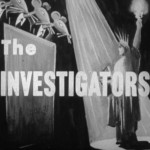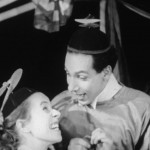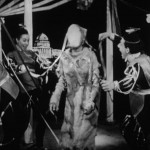Produced by Carl Marzani; directed by Max Glandbard; script by Abel Meeropol (as Lewis Allan/Lewis Allen); music by Serge Hovey; cinematography by Victor Komow; sound by Richard Patton [Andy Cusick?]; performed by the John Lenthier Group, featuring Herschel Bernardi. A Civil Rights Congress Presentation of a Union Films Production. Released: July 1, 1948. Screening an HD-CAM transfer by the Library of Congress, from a 16mm print in the Max Glandbard Collection, Yale Film Study Center (New Haven, Ct.). 10 mins.
The Investigators brought together a group of remarkable left-wing artists during a final post-World War II, Popular Front burst of cultural activity. Not surprisingly, however, this 10-minute musical farce became an orphaned film. It suffered from the Red Scare just like its creators and their colleagues. The blacklist drove them apart as they struggled with job insecurities, exile, stress-related heart attacks and prison. Producer Carl Marzani never mentioned the picture in his five-volume memoir.[1] The sons of Abel Meeropol, Michael and Robert, were unaware of either the film or the playscript reproduced in this program. Max Glandbard, who was surprised to have escaped the blacklist and so continued working in film and television, never talked about The Investigators though he kept a 16mm film copy of it in his personal collection––which he passed on to his son Eric. Virtually forgotten, The Investigators was never abandoned. Collectively the Marzani, Glandbard and Meeropol families made today’s event possible and turned this occasion into a kind of reunion.
Union Films was an informal collective: its key members were Marzani, Glandbard, Vic Komow and Charles Patton who made over two dozen documentaries and campaign films between 1946 and 1953. With Marzani in charge and the United Electrical Workers (UE) providing the necessary funding, Union Films quickly established its reputation with Deadline for Action (September 1946), a forty-minute documentary that took forceful aim at American corporations, particularly General Electric. Marzani, however, was made to pay a price and was quickly indicted for concealing his past ties to the Communist Party. Convicted in May 1947, he remained largely free on appeal and stayed busy making films until he was sent to prison in March 1949. When Union Films began to put credits on its films––and The Investigators is the earliest available Union Films production that has such credits––his name never appeared, principally because the explicit association of a “convicted red” would have curtailed distribution and exhibition opportunities as well as financing. [2]
The making of The Investigators raises a series of unanswered questions. How was the Civil Rights Congress (CRC) involved in The Investigators? Founded in April 1946, the CRC focused much of its efforts on the legal defense of labor radicals, with Marzani’s appeals providing one of its early cases.[3] Perhaps the CRC helped to find funding for the film. Again, what was the nature and extent of Union Films’ collaboration with Abel Meeropol and Serge Hovey since the production people were based in New York while Meeropol and Hovey may have been living in Los Angeles? (The film was shot in the Union Films studio: a brownstone on 111 West 88th Street, which Marzani had bought early in 1948 when moving back to New York City.) Likewise, how did the John Lenthier Group come into contact with Union Films and what are the names of the actors other than Herschel Bernardi? In fact, although Union Films worked in a range of documentary forms, its staff all had extensive experience in the theater (including former actress Edith Emerson who was married to Carl and played a key behind-the-scenes role in the group).
As an artist, Abel Meeropol is perhaps best known for the words and music of “Strange Fruit,” which achieved iconic form as sung by Billy Holiday, and the lyrics of “The House I Live In,” sung most memorably by Frank Sinatra and Paul Robeson. Meeropol was, moreover, remarkably productive––and forcefully political. His poetry often appeared in the New Masses, and among his many works in the late 1940s was “The Ballad of the Hollywood Ten.”[4] Since he often reworked his lyrics to fit changing circumstances, there are at least four somewhat different versions of The Investigators. An initial version appeared in a July 1946 issue of The New Masses, while a later version was published by the National Education Committee of the Jewish Peoples Fraternal Order. [5] The version reprinted here is a typescript for the Chicago Arts Committee for Wallace, dated June 1948. It had been judiciously cut and further reworked for the film. The New Masses version focused on the theme of education as The Victim demanded “Academic Freedom” rather than “Higher wages” and “No discrimination.” (Meeropol’s day job had been as a high school teacher). The Chicago Arts Committee For Wallace playscript and the film both replace “The Straw Man” with a robot and have electoral politics in mind. (A missing title at the end of the film told audiences to vote for progressive candidates.) The film version is tighter than the Chicago Arts playscript, and I have noted both the excisions as well as a few limited additions in the margins in the pages that follow. The biggest differences between the New Masses version, the Chicago Arts version and the Union Films version are in the endings.
[1] Carl Marzani, The Education of a Reluctant Radical, 5 vols. (New York: Topical Books, 1992-1995; Monthly Review Press, 2002).
[2] For a history of Union Films, see Charles Musser, “Carl Marzani & Union Films: Making Left-wing Documentaries during the Cold War, 1946-53” The Moving Image, 9:1 (Spring 2009): 116-172.
[3] Gerald Horne, Communist Front?: The Civil Rights Congress, 1946-1956 (Rutherford, NJ: Farleigh Dickinson University Press, 1988), 104-105.
[4] Lewis Allan, “ I Saw a Man,” New Masses, 20 August 1946, 8; “War,” New Masses, 3 September 1946, 15; Nancy Kovaleff Baker, “Abel Meeropol (a.k.a. Lewis Allan): Political Commentator and Social Conscience,” American Music, 20:1 (Spring, 2002), 25-79.
[5] “The Investigators,” New Masses, 9 July 1946, 11-13; Baker, “Abel Meeropol,” fn76.



